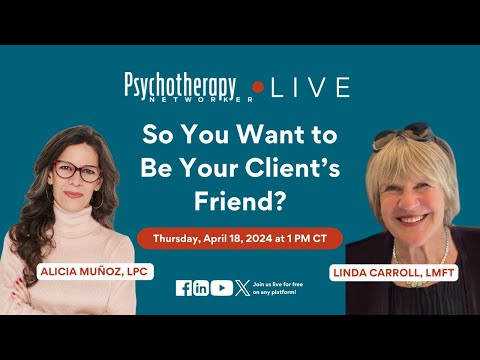Close your eyes, if you would, and imagine someone wise. Who comes to mind? Is it a bespectacled academic, studiously hunched over books or thumbing through stacks of paper? Or is it someone more monastic, perched and meditating on some faraway mountaintop? Maybe it’s a Hollywood kind of sage, like Yoda or Gandalf, who mentors young, starry-eyed pupils with deep, poetic koans?
The truth is, many of us are so caught up in the idea of wisdom being an elevated, almost magical state, we can forget that we therapists—and our clients—are perfectly capable of thinking wise thoughts, making wise decisions, and taking wise actions.
In fact, one of my clinical goals is to help clients develop wisdom, which is not only measurable and teachable, but closely aligned with much of the work we already do.
Our clients might come to us to solve specific problems, but research and my clinical experience suggest that some are also interested in tackling the bigger more existential questions tied to life’s meaning and purpose, like: What does it mean to be human? Is my purpose and passion aligned with how I’m living, or who I’m living with? How do we courageously face the troubles of this world? Part of our role as wise therapists is to be attuned to these types of questions. Through that receptive listening, we set the stage for our clients to build up their own inner wisdom.
The Wisdom Environment
When it comes to using wisdom in treatment, I like to think of it the way Aristotle did: as the most practical of virtues. He taught that fundamental social practices demand that we choose how to be fair, how to take risks, and how to act in ways that balance our individual needs with those of the community. His aim wasn’t to dictate “correct” behavior, but to identify skills that lead to better problem solving. Having these skills, he believed, was a manner of being wise.
In this way, practical wisdom can be viewed as practices that help us determine what’s valuable in life and how to pursue and nurture what we value. It includes not just balancing other people’s needs with our own, but regulating our emotions, showing compassion, and making measured decisions.
Sounds a little like therapy, no? Could it be that many therapists, regardless of their favored approach or interventions, have unknowingly been in the business of teaching wisdom all along?
According to wisdom research being conducted at places like the University of Chicago and the University of California, San Diego—yes, wisdom is now an area of scientific study!—being wise isn’t about accumulating knowledge; it’s about being inspired to grow as we face life’s challenges, practice empathy, and make decisions that are in line with our values and moral code. It requires not only cultivating a range of internal resources but expanding our ability to access those resources. Fortunately, this is work every therapist is well-equipped to facilitate. Think of it this way:
Managing uncertainty refers to neither overestimating nor underestimating what we can control. People who manage uncertainty wisely are mindful of their biases and cognitive traps, which can cloud their ability to be objective when approaching their problems.
Openness is a mindset that includes curiosity and a willingness to experience life in all its complexity. People with an open mindset are more likely to learn by engaging in meaningful conversations and seeking out diverse experiences. They approach every encounter (and mistake) as an opportunity to learn something new.
Reflection is often considered a cornerstone of wise problem-solving. In fact, the ability to reflect on a life experience and learn from it appears to be more crucial to the development of wisdom than experiences themselves.
Emotional regulation and empathy are aspects of wisdom that involve awareness and sensitivity to one’s own feelings and the feelings of others, as well as the capacity to regulate those feelings. Empathic qualities foster compassion, connection, and mutual understanding, which lead to more meaningful relationships and a greater understanding of the human experience.
Of course, when clients are going through a tough time, pointing out that it’s a growth opportunity for wisdom won’t get you far, but when they’re ready, many clients will be intrigued by the idea of developing “wisdom” as a clinical goal.
As with all therapy, the process is dynamic, not sequential. It centers on helping clients explore their feelings, identify their values, and get curious about the places where their feelings and values conflict. At its core, the work is about assisting our clients to cultivate their best selves. As a major contributor to better health, sense of wellbeing, decision-making, life satisfaction and resilience, wisdom is a psychological asset.
Fostering Wisdom in Therapy
At 66, Ellen felt like a diminished version of herself. Filled with shame for staying in a loveless marriage, she’d had four stints in individual and couples therapy over the past three decades, but found that none of the positive changes therapy had brought to her marriage had stuck. She and her partner Jim always went back existing in what she called their lonely, empty voids. “Its’ time to either stay and accept our relationship, or go,” she said. “But I’m scared of making the wrong decision.”
“I don’t know about ‘right’ or ‘wrong,’” I responded. “But I can certainly help you make a wise decision,” I said. “And I can help you build the skills you need to make wise decisions moving forward.”
She was intrigued, and I began the process by listening to the information she believed was relevant to her situation. She had a nuanced understanding of her family and relationship history. She was clear about no longer being willing to live in a state of limbo and self-recrimination. Her commitment was to exploring her current priorities.
Over many months, we thought through possible solutions to her dilemma, examining the potential risks and rewards associated with her options, as well as the ethical principles aligned with each one. We were intent on finding a solution that balanced her values (such as loyalty and persistence) with her needs and feelings. Using a kaleidoscope as a metaphor for her personal and relational development, we looked at how her values could remain but be recombined to show a different pattern—one more in the service of who she was becoming than who she’d been in the past. This helped her drop the binary mindset she’d been using to approach her decision about her marriage.
After Ellen identified her feelings and reflected on one of her values, we’d return to information gathering. We’d do a cost/benefit analysis and consider options and whether they aligned with her vision of what was best for her, her partner, and her family. Together, we reframed her decision as one in which all choices were different configurations in a kaleidoscope reflecting what we knew and the best options we were aware of in the moment.
Over time, Ellen felt clear and ready to make a decision: to stay in her marriage. “Right now, I need the security and continuity of my family more than I need my image of a ‘perfect, love-filled’ marriage,” she told me during one of our sessions. “I’m learning how to identify and balance the weight of conflicting needs. And I’m learning to forgive myself for being human, which makes it easier to state my case with Jim and make requests.”
The more we talked, the more she began to view her marriage as a classroom where she could learn to cultivate a deeper understanding of her strengths and vulnerabilities as well as those of her partner, and explore ways of maintaining a glass-half-full perspective.
The peace she gained from our work together is a testament to the wisdom she fostered through the process.
Karen Skerrett
Karen Skerrett, PhD, is a clinical psychologist and registered nurse with over 40 years of experience as a clinician, academic, and author who specializes in strength-based approaches to healing and change across the lifecycle. Her latest book is Growing Married: Creating Stories for a Lifetime of Love. Learn more at karenskerrettphd.com.













